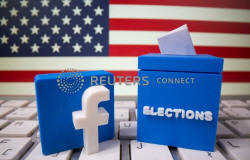Facebook bans militarized calls for poll watching but
won't pull 'Army for Trump' video
 Send a link to a friend
Send a link to a friend
 [October 08, 2020] By
Katie Paul [October 08, 2020] By
Katie Paul
(Reuters) - Facebook Inc on Wednesday
banned calls for poll watching that use "militarized language," as it
tightened a slew of restrictions ahead of U.S. elections next month amid
mounting alarm that unfounded claims online could result in violence.
The world's biggest social network is scrambling to adjust its rules for
the Nov. 3 vote, despite saying last month that it had set its final
policies, as Republicans mobilize
https://www.reuters.com/article/
idUSKBN26L3M5 thousands of volunteers to watch polls for evidence
backing up President Donald Trump's unsubstantiated complaints about
voter fraud.
The president's son Donald Trump Jr. sought such volunteers for this
"Army for Trump" in a September video that racked up millions of views
on social media.

Facebook is allowing that video to stay up, while confirming that it
would be in violation of the company's new rules.
"When we change our policies, we generally do not apply them
retroactively," Facebook Vice President of Content Policy Monika Bickert
told reporters on a call. "Under the new policy, if that video were to
be posted again we would indeed be removing it."
Voting-rights activists are concerned encounters at polling stations
could escalate in a tense year that has already seen armed militias face
off against protestors in some cities, much of which has been organized
on social networks.
The Democratic Party has hired voter protection directors
https://www.reuters.com/article/
idUSKCN24O184?enowpopup in more than a dozen states to lead more
comprehensive operations than in past cycles, party officials have said.
STRUGGLE TO SETTLE
Facebook also extended a moratorium on new U.S. political advertising,
following in the footsteps of Alphabet Inc's Google in saying it would
block such ads indefinitely after polls close.
[to top of second column] |

A 3D printed elections box and Facebook logo are placed on a
keyboard in front of U.S. flag in this illustration taken October 6,
2020. Picture taken October 6, 2020. REUTERS/Dado Ruvic/Illustration

The company has struggled to settle on an approach to political ads. Chief
Executive Mark Zuckerberg last year cast himself as a steadfast defender of free
speech for refusing to impose restrictions favored by the company's peers.
Zuckerberg gave some ground last month, saying in an announcement pitched as the
company's final word on election policies that Facebook would block new
political ads in the week before the election.
Facebook subsequently said it would reject ads that prematurely claim victory or
suggest that official results are invalid.
The company also announced more a proactive approach to organic falsehoods,
which election experts have warned could be the biggest threat on Election Day.
It said it would respond to candidates or parties making premature claims of
victory by adding a label saying the election has not yet been called and
showing notifications at the top of news feed with authoritative information
about the state of the race.
Posts from presidential candidates contesting the official outcome would get a
label showing the declared winner's name, the company said.
(Reporting by Katie Paul; additional reporting by Elizabeth Culliford; editing
by Greg Mitchell, Peter Henderson and Grant McCool)
[© 2020 Thomson Reuters. All rights
reserved.] Copyright 2020 Reuters. All rights reserved. This material may not be published,
broadcast, rewritten or redistributed.
Thompson Reuters is solely responsible for this content.
 |